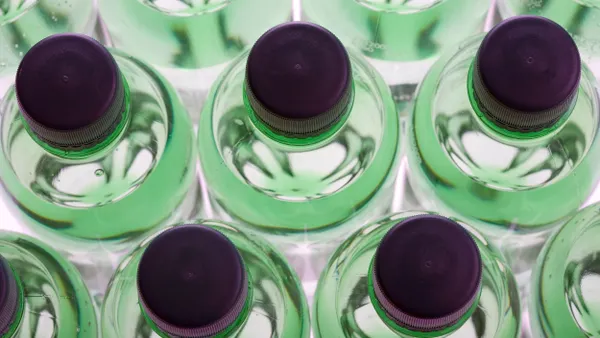Dive Brief:
- The U.S. recycling rate for aluminum beverage cans has declined in recent years, the Aluminum Association and Can Manufacturers Institute reported on Thursday.
- The groups calculated the 2023 rate to be 43%, a decline from an average around 52% since tracking began in 1990 — making it the lowest point in decades and worse off than peer countries, the organizations said.
- “We've stagnated because there haven’t been many changes in the fundamentals of the U.S. recycling system,” said Scott Breen, senior vice president of sustainability at CMI. Breen and partners are hopeful that as extended producer responsibility laws and other policies ramp up, numbers will improve.
Dive Insight:
Since November 2021, CMI members have been pursuing a 70% recycling rate by 2030, 80% by 2040 and 90% by 2050. That 2030 target is looking unachievable based on the current state of U.S. recycling systems and policies, according to a newly released recycling rate target update and sustainability KPIs report from the groups.
The 2023 stats reflect that, on average, each person in the U.S. threw away 15 12-packs of cans — $1.2 billion worth of aluminum. “This is bad for the economy, the environment and national security,” said Aluminum Association President and CEO Charles Johnson in a statement.
CMI is adamant that policy changes can be some of the most impactful levers for change. In 2025, as part of the Coalition for High Performance Recycling, CMI plans to again push for EPR laws and “recycling refund” policies (also known as bottle bills or deposit return system legislation) in “strategic states,” namely Illinois and Washington, Breen noted.
At the federal level, AA and CMI also still want to see the Recycling Infrastructure Accessibility Act and the Recycling and Composting Accountability Act get passed in Congress.
“While the recycling rate may have stagnated, it's not because we were sitting back,” Breen said. Aside from policy, CMI is taking actions like helping to fund technology upgrades at MRFs and supporting collection at events like Mardi Gras.
The Recycling Partnership echoed CMI in calling well-designed EPR policies “some of the most effective tools we have.” Commenting on the decreasing rate, TRP called out declines in access, education, participation and funding for recycling programs across the U.S.
TRP says its data shows that 9% of the U.S, population still lacks access to a recycling program that accepts aluminum cans, and up to 25% of aluminum beverage cans can be lost during sorting due to insufficient sorting processes, according to an emailed statement from Brittany LaValley, vice president of materials advancement.
TRP’s State of Recycling Report for 2024 found that recycling participants only capture 55% of aluminum cans in the household. “While aluminum cans are among the most widely accepted packages for recycling, our data shows that Texas and Florida alone lose an estimated 94,000 tons of recyclable aluminum to landfills each year. Nearly 3 in every 4 aluminum cans in the region are thrown in the trash instead of recycling,” LaValley reported.
“Without adequate access to and education about recycling, and funding to bolster its infrastructure, the United States will continue to lag peer countries in recycling aluminum,” LaValley said.
Breen also noted that some other countries offer more financial incentives for redemption and greater access to recycling, be it at the curbside or through drop-off sites.
This 2024 release is the first update since 2021, but CMI intends to calculate the rate annually going forward. The 43% rate for 2023 was calculated based on survey input from can sheet producers, can manufacturers and secondary producers of aluminum, as well as Census Bureau trade data.
The groups also reported that the average recycled content of an aluminum can made in the U.S. is 71%, down from 73% in 2019 but exceeding the rate for other container substrates.
Correction: A previous version of this article misidentified which states will be a focus for CMI’s policy advocacy. They are Illinois and Washington.











